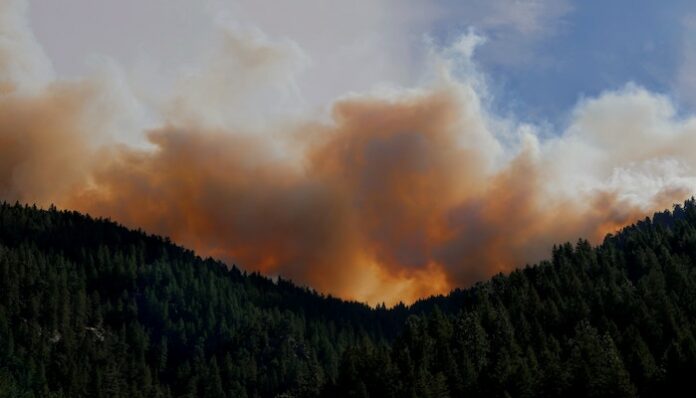
I remember going to work in the first week of June, to a job at my college. The air around me felt heavy and dense, but I didn’t know what was happening. I tried to ignore it, but something felt off.
While at work, my partner sent me a photo from his apartment unit in downtown Toronto. The skyscrapers were out of sight, with thick fog surrounding the buildings.
Strange, I thought.
While commuting to my after-school job, I heard from others that a wildfire was happening in Quebec. And on top of that, I found out there was a gas leak at a local hospital.
But when I arrived at work, upper management refused to address the issue of the wildfire. My coworkers felt uncomfortable going outside, and no one sent an email about the air quality.
This frustrated and angered me, as it seemed like no one cared about the children’s health, and the devastating effects the wildfires have on many frontline workers.
No one really saw how climate change was affecting us on another level.
Throughout the past week, I heard from many of my colleagues that the fog and the mist from the wildfires have led to serious side effects. Some of them said they felt their eyes watering, noses itching, and throats clogged up. But due to their job, they’re almost forced to work in such conditions.
These jobs range from construction workers, to teachers, to even my fellow colleagues at the after-school program. Despite the air quality, we all had to come to work. Moreover, we had to go outside, walk to different schools, and pick up the children.
The particles from the smoke were extremely dangerous to people with heart disease, asthma, or chronic obstructive pulmonary disease. However, everyone who went outside was at risk.
You can all give us the suggestion to call in. But for some people with health conditions, they feel they have no choice but to come to work. So how is it fair that they have to face this exposure? Especially if their jobs have zero to little health benefits.
These professionals who work outdoors, throughout the wildfires, are risking their health just to provide a service for us. Air pollution kills more than 3 million people a year, leading to increased hospitalizations, and missed school days. But for so many people out there, they can’t miss work or else they won’t be able to put food on the table.
The issue of wildfires is sinking deep into the exasperating social issues nowadays.
Think of those who are experiencing homelessness. If shelters continue to reach capacity, where else can people reside? Their only place is outdoors, facing the effects of the wildfire. But if they have a comorbidity or a heart or lung disease, it’s inhumane for them to receive this kind of treatment.
For those who are living in poverty and making low wages, organizations and companies need to step up to demand change. Imagine working outdoors all day for a low wage, then having a health condition which stops you from working. At this point, you’re forced to choose between not having dinner and a visit to your doctor, which you may have to pay for out of pocket.
But how can we be forced to choose between work, health, and life? We should receive all of these options.
The wildfires impact more than our own health and climate. They impact our social structures, which inequality has already broken and corrupted. Therefore, our social structures need a reformation for workers who have to choose between life and death. They don’t deserve to be in this position, and they should be valued for the work they do.
So to every politician, CEO, manager, or director out there, please put your staff first and advocate for them throughout this situation. They don’t deserve to be making these sacrifices every day. They deserve to be heard. If our generation is the first generation to make these changes, we can continue to pass them on, and to make this world a better and more sustainable place.
Photo by Malachi Brooks on Unsplash



















Thank you